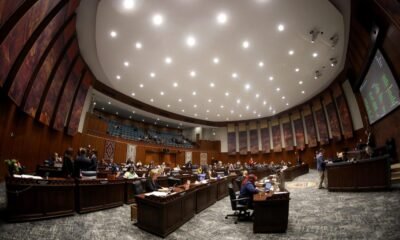arizona constitution
Education Advocates Unite to Oppose School Choice in Prop. 123 Campaign

Republicans are expected to unveil the final language of Proposition 123 on May 19, aimed at increasing teacher pay while establishing constitutional protections for school choice.
Originally planned for rapid approval before a legislative recess, Senate leaders, including President Warren Petersen and bill sponsor J.D. Mesnard, acknowledged the need for consensus on the proposal’s specifics.
Mesnard emphasized the importance of thoroughness in crafting the measure, noting, “There’s still a few Is to dot and Ts to cross.” The urgency of the proposal is underscored by the impending expiration of the current Prop. 123 at the end of the fiscal year.
Opposition from Democrats and education groups, who argue against tying teacher pay increases to school choice proposals, complicates the plan. This coalition has made clear that any such initiative would likely meet significant resistance at the ballot box.
In a recent press conference, representatives from educational organizations reiterated their stance, labeling any combined proposal as potentially unconstitutional. “Prop. 123 is not a tool to be hijacked by Republicans,” stated Sen. Catherine Miranda.
Amidst this contentious backdrop, Mesnard and Rep. Matt Gress are working on a revised education funding measure, which they believe could draw on the state land trust fund to finance teacher salary increases. Currently, the proposal suggests a raise of about $4,000, supported by a 6.9% distribution rate from the fund.
While Republicans aim to include school choice measures in their final draft, Governor Katie Hobbs has categorically dismissed this direction, calling it a “complete and total nonstarter.”
As anticipation builds around the proposed changes, discussions have taken place regarding potential legal challenges. Democrats argue that combining popular teacher pay raises with the more contentious school choice issue could muddle public support.
Rep. Nancy Gutierrez articulated concerns that such bundling misrepresents voters’ intentions. “It’s a false choice,” she asserted, pointing out that separating the issues would more accurately reflect public opinion.
Research director Sharon Kirsch of Save Our Schools Arizona echoed these sentiments, indicating that any proposal perceived as overreaching would face legal scrutiny.
While the measure is projected to head to voters in November 2026, the extent of organizational support remains uncertain. Marisol Garcia, president of the Arizona Education Association, highlighted that previous support for Prop. 123 dwindled when associated with school choice.
As discussions unfold, legislators remain focused on building a viable campaign and gauging public backing for the initiative, which could influence support from potential allies.
In the coming weeks, all eyes will be on legislative developments and the final language of Prop. 123, as it stands to impact both teacher compensation and school choice in Arizona.


















